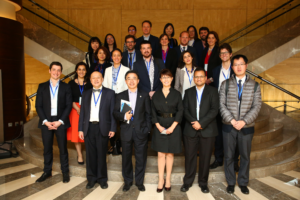Think Week 2017: "Value Chains and the Future of Work in the Digital Age – Opportunities for Emerging Economies"
Sustainable Finance

 Digitalisation: Opportunities for Greener and More Inclusive Value Chains in Emerging Markets
Digitalisation: Opportunities for Greener and More Inclusive Value Chains in Emerging Markets
The impact of digitalisation is growing, not least in emerging markets: Whether it is renting a shared bicycle in New Delhi, taking out a small business loan in rural parts of China or leasing light for Amsterdam’s Schiphol Airport, digitalisation is increasingly shaping the ways people organise their lives and business operations. The public perception of digitalisation within societies is often dominated more by fear of job loss and exacerbated social tensions than by optimism that it will bring increased economic opportunities and inclusiveness in future knowledge-based societies. The need for well-informed policy-making and business models has probably never been more acute. Solid research and analysis on the linkages between technological trends and their economic impact and opportunities are key to underpin both sound policy-making and business models that help societies reap the benefits of digitalisation.
Building on EPF´s successful work around issues of digital infrastructure and skilling, this year´s Think Week, held from 30 October to 2 November in Beijing, looked at how digital transformation will impact value chains and labour markets in emerging economies, and how it can be used to foster sustainable and inclusive growth. Participants included researchers from Argentinian, Chinese, South African, Indian, Russian and Singaporean think tanks, universities and advocacy groups, government policy-makers, officials from the World Bank and the Organisation for Economic Co-operation and Development (OECD), as well as representatives from businesses such as Alibaba or the social enterprise Circle Economy.

The roundtable was organised in discussion sessions and smaller break-out groups to develop concrete project ideas. Proposals for country case studies on the basis of scenario-building, scoping the impact of technological change in the informal sectors and on gender relations, and a modular approach for analysis and pilot projects around matching skill demand and supply in selected countries sparked particular interest. Several participants committed to working out a detailed road map for submission to the EMSD Challenge Fund.
The programme culminated in visits to the offices of Ant Financial, a major fintech company in China, and an exchange with faculty members of the School of Public Policy and Management at Tsinghua University, Beijing. A follow-up webinar on (re-)inventing social protection schemes and the socio-political balancing of pros and cons of a Universal Basic Income will be held in early December.
The Think Week showed: Seizing opportunities to reap the benefits of digitalisation requires more than a contest between “techies” vs. “fuzzies” – the likely economic impacts need to be carved out in country-specific contexts, data gaps need to be identified and filled, domestic and international coordination across investment, tax and intellectual policies as well as education and social programmes are the call of the day, and entrepreneurial thinking and innovation is necessary at all levels of society – in business, government and the education system. Digitalisation is as much an opportunity as it is a collective challenge, and the policy field as yet wide open to be shaped. The interest and concrete project ideas that the Think Week sparked suggest that it made a contribution to tackling these endeavours by bringing a wide range of people into one room for four days.
For further documentation please see:
- Agenda
- Handbook


